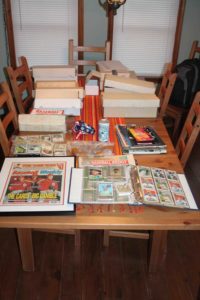 The toughest part of decluttering or living lean for some people is unloading a collection. It’s both time consuming and emotionally challenging.
The toughest part of decluttering or living lean for some people is unloading a collection. It’s both time consuming and emotionally challenging.
I’ve sold my sports memorabilia collection in stages and recently unloaded the last third of it, keeping just a handful of baseball cards and a few pieces of memorabilia I accumulated from the age of 6 until I stopped collecting about 25 years ago.
That represents two decades of collecting, both as a kid and a young adult. Plus, as a full-time baseball writer throughout the 1990s, I accumulated lots of items such as press passes, schedules, press pins, yearbooks, and other odds and ends.
The collection didn’t generate the money I’d hoped and I could have raised more if I broke it up and listed the items myself on eBay. But I didn’t want to take the time to deal with listing items, emailing, packing, and trips to the post office. The extra time would not be worth the additional money. Instead, I found a buyer online who specializes in selling sports memorabilia on eBay and sold everything to him. The collection consisted of several thousand cards, some going back to 1949 and many from the 1960s, plus dozens of autographs and oddball items.
I spread the collection over the dining room table and the buyer spent an hour looking at it. We haggled a bit and I got him to raise his offer about 10 percent, but that was as far as he’d go before I accepted.
Sure the collection was worth something – and I received a fair price, although again less than I’d hoped. In the end, though, it was just cardboard and paper that had been sitting in my closet for 18 years. That’s how long we’ve been in our current house; the collection took up space in the closets of previous homes. I dragged it from home to home and probably could have sold it for more years ago before the sports collectibles market softened in the early ‘90s.
It was just excess baggage. Over the years I’ve interviewed pro athletes at their homes for stories. What struck me most – aside from the size and elegance of these homes – is that most of these athletes didn’t have much of their own memorabilia on display. Some had collections of memorabilia for athletes they’d played with or against – or players they admired from a previous generation. But for the most part, they didn’t bother with their own memorabilia.
I figured if athletes didn’t want their own stuff, why should I?
Thanks to the Internet and digital media, there’s no reason to stockpile books, magazines, music, movies, or memorabilia. As a kid without cable TV in the late 1970s and early ‘80s, I turned to baseball cards as a primary way to follow baseball, a notion that seems preposterous in the digital era. After all, for more than two decades, the Internet has provided all the information a sports fan could want.
Collecting, whether sports memorabilia or anything else, has a downside. It produces a mindset that everything has value and that you should continue accumulating until you have the definitive collection. It takes lots of space, time, and money.
You spend a disproportionate share of your time on collecting stuff rather than experiencing things. Eventually you lose interest or no longer have space and must dispose of the stuff. That’s when you realize how much – or rather, how little – your prized collection is worth.
People don’t collect things like stamps, coins, and Hummel figurines like they did a generation ago and that’s good. No longer do they fill their homes with collectibles and knickknacks. Our society is more fast-paced, or at least screen obsessed, and people are less likely to spend an afternoon tinkering with Lionel trains or organizing baseball cards.
It’s important to appreciate the past, cherish and learn from it, but there’s no need to hold onto boxes of trinkets. Any of the thousands of cards and memorabilia pieces I sold can be found online. There was no need to even take pictures before the sale.
Before the buyer arrived, I looked over the collection spread across the dining room table. Some of the cards I’d obtained from childhood friends, two of whom are now deceased. I thought of the countless hours I’d spent accumulating the collection by attending card shows, buying packs at the supermarket, trading with friends, and following the market.
It wasn’t wasted time, of course. I loved following sports as a kid and that obsession, which included collecting sports cards and memorabilia, prepared me more for an early career as a sportswriter than any class I took in college.
To live mindfully and free of clutter, though, it’s necessary to let go of things that no longer make a contribution to your life and your future. Perhaps you have such a stockpile, whether it’s a collectible, hobby, or entertainment interest that stopped commanding your attention long ago. It’s time to say goodbye. Thanks to eBay, Facebook Marketplace, and other avenues, it’s never been easier.
I thought I’d feel sad when I boxed up the collection and helped the buyer load it into his SUV. Instead, I felt like a burden had been lifted. Plus I had a few extra bucks.
The memories, of course, I’ll have forever.
It’s just I no longer need huge boxes in my closet to remind me.
